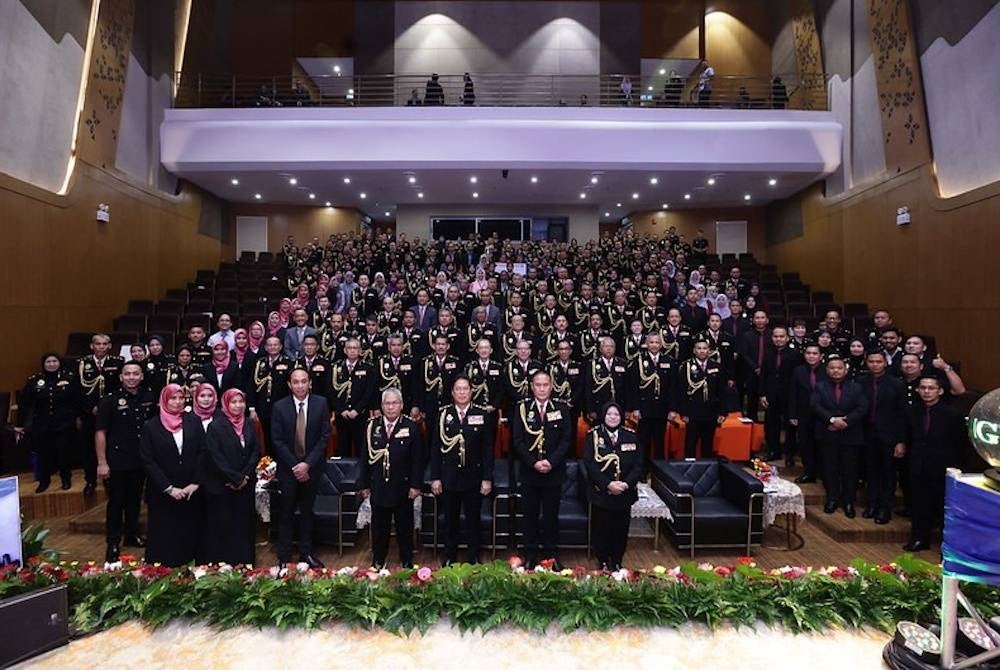'2023, a successful year for MACC' - Azam Baki
MOHAMAD HISYAMUDDIN AYUB
PUTRAJAYA - The Malaysian Anti-Corruption Commission (MACC) has described this year as a successful year in their pursuit of graft busting.
Its Chief Commissioner Tan Sri Azam Baki said the MACC had recorded very commendable performances through proactive actions in carrying out various operations, arrests, and charges.
He said that this included charges related to high-profile and public-interest cases, even in the face of various ongoing challenges.
"For the period of Jan to Aug 2023, a total of 776 investigation papers were opened, resulting in 869 arrests.
"In addition, a total of 326 charges for various offences have been brought to court," he said in his speech on the occasion of MACC's 56th anniversary yesterday.
Also present were MACC Deputy Chief Commissioners, Datuk Seri Ahmad Khusairi Yahaya (operations), Datuk Seri Norazlan Mohd Razali (prevention), and Datuk Junipah Wandi (management and professionalism).
Azam said that asset forfeiture and recovery statistics showed outstanding records for this year, with asset forfeiture amounting to RM12.89 million and compound fines totaling RM4 million.
He said that, if calculated from 2018 until now, the total value of asset forfeiture and penalties recorded by the MACC amounted to RM29.37 billion.
He stated that this outstanding achievement was accomplished through the MACC's strategy of reducing leakages in three sectors: corruption in enforcement, procurement, and corruption.
Azam also pointed out that a change in the investigation method to "intelligence-based investigation" had also yielded positive results.
He emphasised that MACC was no longer solely reliant on reactive methods.
He also pointed out that changes in the political, economic, and socio-cultural landscape should be of concern to MACC staff.
"We cannot be complacent, thinking that we are the best and that our methods do not need to change.
"The old guard cannot claim that the old ways are effective, and the newcomers must learn from the old guard and explore change," he said.
Azam said that in facing the current challenges in the digitalisation era, more technologically advanced surveillance methods needed to be explored.
For example, he said that while in the past, the MACC relied more on human surveillance, the commission now had technology for systematic and strategic suspect tracking.
He added that data analysis methods in surveillance were highly demanded, further enhancing the skills of surveillance officers in line with the latest technology.
In addition, he stressed that to combat leakages, the MACC would focus on large-scale and public-interest cases.
"Criminals who steal or misuse government funds and those who have the power to abuse power need to be punished, even to the point of bankruptcy, so that state assets are returned.
"In this regard, financial crime investigation methods need to be intensified, and MACC officers need to understand criminal law and use more systematic investigation methods," he said.
MACC strengthens its operational and preventive sectors.
In the same vein, MACC will continue to strengthen its operational and preventive sectors to more effectively combat corruption.
Azam said that this effort included strengthening intelligence activities, enforcement, and community education activities.
He also said that more effective and efficient anti-corruption efforts would be undertaken through a three-pronged strategy for carrying out the commission's functions more effectively.
"Planning and operational actions must be aligned with prevention sector planning and actions to achieve a more effective and comprehensive impact.
"Focus will also be given to asset forfeiture actions and the recovery of criminal assets through a holistic approach.
"This is to ensure that the proceeds of these illicit activities can be returned as state revenue and indirectly disable the root causes of criminal behaviour," he said.
Azam said that all these stringent actions were carried out through the enforcement of the Malaysian Anti-Corruption Commission Act 2009 (Act 694) and the Anti-Money Laundering, Anti-Terrorism Financing, and Proceeds of Unlawful Activities Act 2001 (AMLATFPUAA 2001).
He added that the seizure of assets and asset recovery related to crimes was an effective method in the pursuit of investigation findings, in addition to criminal charges.
He emphasised that this method not only yielded better results but also returned stolen government funds.
Moreover, he added that this method served as a punitive measure to punish wrongdoers, in addition to imposing imprisonment and fines in court.
According to Azam, more focus should also be given to strengthening the management sector to ensure efficient services and the enhancement of the capabilities of MACC staff on an ongoing basis.
"MACC staff are required to perform their duties with full responsibility, sincerity, fairness, and professionalism.
"An excellent work culture, commitment, diligence, and discipline must always be practiced among all MACC staff in line with the MACC Anti-Corruption Plan 2021-2025 (PARAS) and the MACC Code of Ethics and Conduct.
"In addition, close cooperation with the media is very important in disseminating any operational information," he said
Download Sinar Daily application.Click Here!














